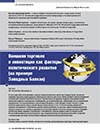Foreign Trade and Investments as Political Development Factors (on the Example of the Western Balkans)
DOI: 10.33917/es-8.166.2019.66-75
The article presents analysis of the dynamics and structure of foreign economic relations of the Western Balkans countries, considers the specifics of foreign infrastructure investment projects, evaluates the importance of foreign economic relations for socio-political institutions. Scientific novelty of the study is determined by application of least squares methods and gravitational modelling. To identify factors determining the vector of economic cooperation, the authors have analyzed macroeconomic data, as well as the trade flows dynamics: gravitational model of foreign trade was taken as the basis. The authors assume that many problems of the modern socio-economic and political development of the region stem from its past, namely from reproduction of both individual elements and the system characteristics of historical models. In particular, the analysis confirmed historical dependence of the political and economic development of the Western Balkans on external players. Historical determinism of the foreign policy course (identified through institutional analysis) coexists with economic factors arising the incentives of neoclassical economic theory
References:
|
1. Pavlovskii G. Sistema RF. Istochniki rossiiskogo strategicheskogo povedeniya [The RF System. Sources of Russian Strategic Behavior]. Moscow, Evropa, 2015, pp. 130. 2. Vishnyakov Ya.V., Ponomareva E.G. Serbiya na Balkanakh: izobretenie “porokhovogo pogreba Evropy” [Serbia in the Balkans: Invention of the “European Powder Magazine”]. Sovremennaya Evropa, 2018, no 7, p. 115. 3. The World Factbook. Central Intelligence Agency, available at: https://www.cia.gov/library/publications/the-world-factbook/ 4. Demirtaş B. Turkey and the Balkans: Overcoming Prejudices, Building Bridges and Constructing a Common Future. Perceptions, 2013, vol. XVIII, t. 2, p. 173. 5. Bulent A. Turkey and the Balkans: New Policy in a Changing Regional Environment. SCRIBD, available at: https://ru.scribd.com/document/111688725/Turkey-and-the-Balkans-New-Policy-in-a-Changing-Regional-Environment. 6. Priest B. Turkish and Saudi Involvement in Bosnia-Herzegovina and Kosova. 1990’s to present. ACADEMIA, available at: https://www.academia.edu/12253308/Turkish_and_Saudi _Involvement_in_Bosnia-Herzegovina_and_Kosova_-_1990_s_to_the_present/ 7. Blagovčanin P. ARAPI U BiH: Poželjni turisti ili nepoželjna prijetnja? Tačno, available at: https://www.tacno.net/novosti/arapi-u-bih-pozeljni-turisti-ili-nepozeljna-prijetnja/ 8. Zeneli V. What Has China Accomplished in Central and Eastern Europe? The Diplomat, 2017, November, 25, available at: https:// thediplomat.com/2017/11/what-has-china-accomplished-incentral-and-eastern-europe/ 9. Kitaiskii faktor v razvitii stran rossiiskogo poyasa sosedstva: uroki dlya Rossii [Chinese Factor in Developing the Countries of the Russian Neighborhood Belt: Lessons for Russia]. Nauch. doklad. Moscow, Institut ekonomiki RAN, 2018, p. 42. 10. China goes to Serbia: infrastructure and politics. Osservatorio balcaniecaucaso transeuropa, available at: https://www.balcanicaucaso.org/eng/Areas/Serbia/China-goes-to-Serbia-infrastructure-and-politics-185401. 11. World Bank Open Data, available at: https://data.worldbank.org. 12. Chaney Т. The Gravity Equation in International Trade: an Explanation. Toulouse School of Economics, available at: https://www.tse-fr.eu/sites/default/files/medias/doc/by/chaney/distance.pdf. 13. ESCAP Trade Analytics Portal, available at: https://trade.unescap.org/analytics/index.html. 14. Hofstede G. Culture’s Consequences: International Differences in Work-Related Values (2nd ed.). Beverly Hills CA: SAGE, 1984, 327 р. |



